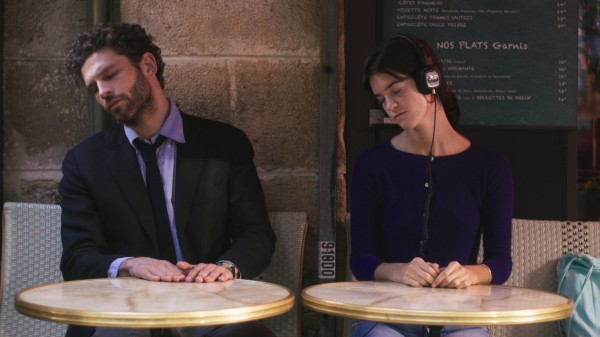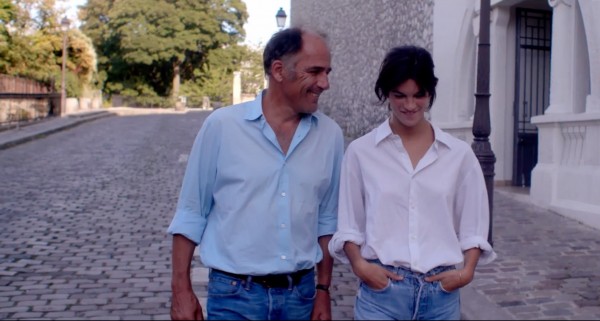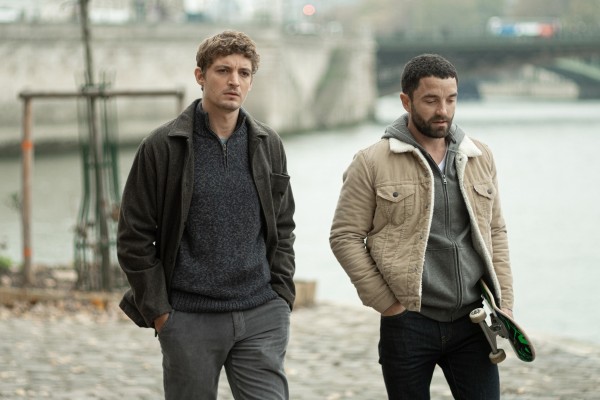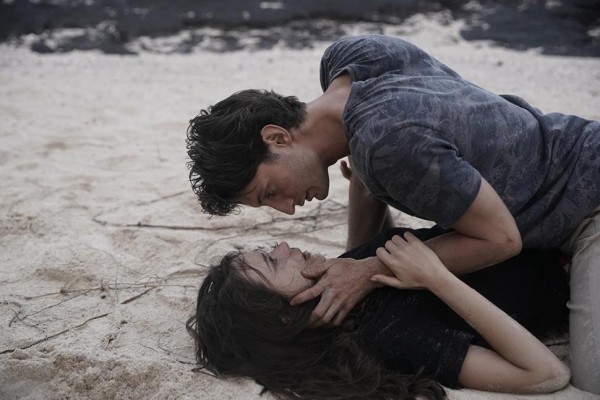-
SLALOM (Charlène Favier 2020)
CHARLÈNE FAVIER: SLALOM (2020)

JEREMIE RENIER, NOÉE ABITA IN SLALOM
The illicit world of a ski coach and the teen girl star he loves too well
This compact little film is good at focusing on its 15-year-old girl ski trainee Lyz (Noée Abita), who's completely in thrall to her verbally abusive, soon-to-be sexually abusive coach, Fred (Jérémie Renier, the Dardennes brothers' once blond and youthful darling, gnarly and unrecognizable here but as intense as ever). He is very mean to her verbally, but then she wins and he's grudgingly approving, and she's hooked: the win is a high in itself. And how could she do it without him, since he is the linchpin of the framework of training and competition that enables the wins, and could lead on to the Olympics, from what he says?
The film smoothly intensifies its focus, as Fred isolates Lyz. Her emotionally rather distant or at least very retrained mother (Muriel Combeau) is already away in Marseille for a job, leaving Lyz to fend for herself at home. Now Fred removes Lyz's teammate and friend Justine (Maïra Schmitt). Then he gives her special favors, top of the line skis from a sponsor, with his wife Lilou (Marie Denarnaud) standing approvingly by. Then Lyz wins big - champion of France - and Fred is ecstatic, and the real abuse begins, the sexual inappropriateness. Lyz turns on the boys on the team too, it's worth noting; but they haven't the access Fred has, and don't matter. She is inexperienced, ignorant of sex, even about her period. When Fred speaks to her intimately and helpfully about that, he takes the place of her mother. Better wi-fi for homework consultations as the excuse, Fred moves Lyz into his house.
As they become more intimate - and this is the film's subtlety and balance - Fred becomes more vulnerable, admitting in a key scene that his own ski career would up a total failure due to injuries and he had nothing. "Nothing?" "There's you." So in a way she means everything to him, too, as he dominates her world,and this is almost as much a secret love affair as it is hidden abuse, not that it doesn't remain abuse. It's complicated, okay? And lest that seem a copout, consider this: such complexity, and the frank details, along with the authentic settings in the French Alps and above all the high caliber of the cast, especially Abita and Renier, are all things that make this much more than a TV movie, even if its trajectory is predictable. About that, Jordan Mintzer in his Hollywood Reporter review suggests (as can be said of the greatest classic stories) that it's not the what but the how of the telling that counts here. But one can also say as Peter Bradshaw does in his Guardian review, that this film ends its story too soon and doesn't fill in enough background (what happens to Fred, and how many teen girl ski protégés has he gotten intimate with before?). There are some quibbles. The final moments seems like a scene from a movie, not from the real life of a top athlete. Perhaps the director, who says this is based on personal experience, had gone as far as she could bear. But much of this film works well, and this is a strong debut fearure for Favier on a timely topic.
Slalom, 92 mins., was a Cannes 2020 official selection, and debuted at Angoulême, included in seven other festivals in both Europe and Asia. A Kino Lorber release in the US, it was screened for this review at home as part of the all-virtual FLC-UniFrance 2021 Rendez-Vous with French Cinema on Mar. 7, 2021.
Last edited by Chris Knipp; 03-10-2021 at 02:04 AM.
-
SPRING BLOSSOM/SEIZE PRINTEMPS (Susanne Lindon 2020)
SUSANNE LINDON: SPRING BLOSSOM/SEIZE PRINTEMPS (2020)

ARNAUD VALOIS, SUSANNE LINDON IN SEIZE PRINTEMPS
A light French take on May-December romance
May-December with a difference, because in this film Susanne (writer-director Susanne Lindon, now 20) is a mature 16 and Raphaël (Arnaud Valois) is a youthful 35 and the guy doesn't seem to an older viewer very old himself. Not at least till, that is, we do the arithmetic and realize Raphaël's 19 years Susanne's senior and thus more than twice her age. Yet Raphaël seems to approach Susanne in a sweet, courtly manner, like a sublime platonic object and the affair never (apparently) becomes sexual and seems determined not to.
It's no mystery why she'd fall in love with him. He's handsome and a bit (but not too) brooding, with a nice close-cropped beard and curly hair. It's not so clear why he'd fall for her. Out of politeness, out of boredom, because she's cute (rather like a young Charlotte Gainsbourg) and shy but poised, with an authentic smile. For him it's a beautiful but impossible flirtation. For her it's wonderful, until it's too much.
Thus somehow on the face of it Lindon avoids #MeToo issues - which may be provocative, nowadays, in itself. But in doing so, she gives us something simple and classic if also, because the writing is a little juvenile and the film is short and ends abruptly and is not just admirably minimalist as it wants to be, ultimately a bit sketchy and wan. But, however a product of privilege, it's also a talented debut that hints of more and hopefully better to come when the precocity blends with experience.
Is this a platonic relationship - or are the hand and head dances in unison, as stylized as something in a Eugène Green film, a way of symbolically reenacting foreplay and sex? The musical and dance numbers in the film at least are its way of expressing how the emotions soar.
I was reminded of a long-ago Paris literary hit that came to the US when in the mid-fifties, at only 18, Françoise Sagan published Bonjour Tristesse, her instantly famous precocious short novel about the 17-year-old Cécile who has a summer affair in front of her indulgent, wealthy parents with a 20-something man on the French Riviera. Both Bonjour Tristesse and Seize printemps ("Sixteen Springs" a title redolent of John Hughes) have an air of privilege, in the works themselves and the works' origins from a world of well-off Parisian Bobo's ("bourgeois bohemians"), or better in this case, since Susanne Lindon, who wrote this at 15 and has produced and starred in it at 20, is the daughter of the two most famous and admired actors of France, Vincent Lindon and Sandrine Kiberlain. Doubtless they live in a "grand appartement bourgeois," using the term not as it's bandied about in rental listings but in its grander sense of a big old many-roomed high-ceilinged apartment in one of the best parts of Paris - in Susanne's case in the 18e arrondissement, Montmartre, a short walk from the Théâtre de l'Atelier where Raphaël is acting in a play when Susanne spots him at the nearby café and begins to spy on him.
In this short feature Susanne (the writer-director) is a cute, boyish girl with her own style of tight faded jeans and mannish white shirts. She is bored with her lyçée, with her classmates, and with boys, which at a p;arty she rates all as 5's, on a scale of one to ten. So she looks for someone older and quickly finds him. But she will not even ride on his new red Vespa with him, a fair indication that she's not planning to go to bed with him either, that more dangerous ride. In the current atmosphere, when so many male abusers have been unmasked, we may forget the old French tradition of an older person (granted, more often a woman with a young man) teacher a youth the ways of love.
Susanne, in the film, makes out with a mirror like the boys in French Kissers/Les beaux gosses (Vincent Lacoste's debut), perhaps the sexiest thing in the movie. Her actual kisses from Raphaël or her are courtly pecks, infinitely sweet, but carefully restrained, hardly more than merely more fraught versions of the air-pecks she and all her girlfriends exchange outside the lycée every day. She consults with her dad (Frédéric Pierrot; with him and her mom Florence Viala and sister Rebecca Marder she gets on perfectly) about whether men like skirts better and starts wearing them, and trying to put on eye makeup (with messy results at first). The chaste trysts proceed: sharing a sugary drink, meeting for breakfast, a walk (with the dance moves), a visit to the theater stage (with the dance moves cozier). And then Susanne gets cold feet, and cries to her mom. And boom! It's over.
There is a strong feeing that more could have been done with this; that its success is a seamless mixture of tasteful restraint and limited imagination. But the classic French taste is there. Privilege is also nurturing of talent. Françoise Sagan never did anything else as well known as Bonjour Tristesse. For Susanne Lindon hopefully this may be only the precocious beginning.
Seize printemps/Spring Blossom, 73 mins., was a 2020 Cannes selection shown at Angoulême in Sept.; shown in at least 15 other international festivals including Toronto, Athens, Hamburg, Mill Valley, Chicago, Busan, Vienna and closing film at Glasgow. In the US, a KimStim release. Screened online at home for this review as part of the all-virtual 2021 Rendez-Vous with French Cinema, Mar. 8, 2021.

FRÉDÉRIC PIERROT AS THE FATHER, SUSANNE LINDON AS THE DAUGHTER IN SPRING BLOSSOM
Last edited by Chris Knipp; 03-09-2021 at 03:17 PM.
-
LIFELINES/SI DEMAIN (Fabienne Godet 2020)
FABIENNE GODET: LIFELINES/SI DEMAIN (2020)

LUCIE DEBAY, JULIE MOULIER IN LIFELINES
In search of lost time
When we meet the protagonist, Esther (Julie Moulier, who also appeared in Fabienne Godet's 2013 and 2018 features]) has been drinking for ten days and winds up in the hospital because she can't deal with being dumped by her boyfriend. Then she receives a journal, source unknown, about an 18-year-old devastated when she survived a motorcycle accident her boyfriend died in.
This meditative road picture takes us along with Esther as she forgets her sorrow by trying to track down what happened to this young woman, who apparently ran off and may be traceable to Toulouse. Moulier has a funky, soulful quality; her face looks lived-in, perhaps a drinker's face, though she turns out to be trim and energetic. Esther leaves behind her best friend, Elena (Lucie Debay), even though Elena's cancer has come back. Elena insists she feels fine and she wants Esther to track down this story. Moulier's lived-in quality makes her relatable. If you go with the flow, this is a watchable picture. It takes us to Spain and then to Lisbon, where there is a little girl called Antonietta who goes to the French school and, eventually, the name of the lost girl and her identity is revealed.
Esther is a translator who wanted to be a writer. When she winds up in Spain she speaks fluent Spanish. She also has a stoicism that she needs when a handsome young hitchhiker she was traveling to Spain with doesn't show up the next morning and then her car dies on a remote road and her bag disappears later when she's begun hitchhiking. The handsome young man is played by Arnaux Valois, also the love interest in another Rendez-Vous '21 film, Susanne Lindon's Spring Blossom.
You may guess the surprise ending before it comes, and before that this bracing journey may start to feel futile. But as a place-marker, and thanks to Moulier, and Godet's dp Marie Celette (also the dp for the 2018 film) and surroundings that don't feel conventional, Lifeline has a certain offbeat appeal.
Lifelinea/Si demain, 85 mins., debuted at the Arras Film Festival Nov. 2020. It was screened at home for this review as part of the all virtual Mar. 2021 Rendez-Vous with French Cinema. It is unreleased.
Last edited by Chris Knipp; 03-09-2021 at 11:28 PM.
-
LOVE AFFAIR(S)/LES CHOSES QU'ON DIT, LES CHOSES QU'ON FAIT (Emmanuel Mouret 2020)
EMMANUEL MOURET: LOVE AFFAIR(S)/LES CHOSES QU'ON DIT, LES CHOSES QU'ON FAIT (2020)

Niels Schneider, Guillaume Gouix in Love Affair(s)
Mouret's Shall We Kiss?/Un baiser si'l vous plaît was featured in the 2008 Rendez-Vous with French Cinema, when I cited Derek Elley of Variety sayint he was a combination of Woody Allen and Eric Rohmer. Here, the delicacy is still there; it's shown in its use of Vincent Macaigne and Niels Schneider. The three women are fine. But Mouret's mastery has taken him too far this time. He's working at such a high pitch now, with so many couples coming and going and so much well-chosen classical music from Chopin to Italian opera, that this movie is a bit indigestible. You get lost in it more than once. It's not just me: Even the French critic of Les Fiches du Cinema quoted in AlloCiné, for instance, says it's "difficult to savor the brilliant dialogue. . . under the constraint of the rapid pacing." He adds something I'd not thought of: that "the actors' restrained acting doesn't help." Many viewers find it all too pretentious and overwrought. That's not the Emmanuel Mouret I was so taken by 13 years ago.
It probably is true that many in the cast do downplay, and this robs the film of a comic element one feels surely is meant to be there, but gets lost in the love-longing and false moralist stubbornness of the ladies who refuse to grant their favors sometimes when you know they want to. It's a droll twist to saddle the dreamy Niels Schneider, still notable and compulsively watchable here, with inappropriate casting as a perpetual loveless loser while making the geeky Vincent Macaigne into an apparent success with both wife and mistress and, presumably, job as well, since he lives in splendid digs with grand tapestries, furniture, and paintings. A number of French spectators on AlloCiné, not as thrilled as the critics, saw the plot complications as tedious "Marivaudages" (plot twists of theatrical farce) and the wealthy Parisian "bobo" settings and the formalized, elaborate talk out of touch with reality.
What's to like? Well, the acting is interesting and able at times anyway, and the two main women characters, Louise played by Emilie Duquesne and, especially, the statuesque Daphné played by Camélia Jordana, are very watchable. Everyone is watchable, including the actor playing Gaspard, Guillaume Gouix, who's the only one whose scenes have a broad comical flavor. The ceaseless classical excerpts certainly often do exactly what they're supposed to do to underline the sense of a scene, but are a bit overwhelming and ultimately cloying, like everything else. Some French critics (and viewers) think that Mouret's great success in 2019 with his more mainstream costume film Mademoiselle de Joncquières (which was well received, but I found somewhat lacking) may have given him too much of a swelled head. I don't know, but that might be true.
This is one of the most celebrated of 2021's Rendez-Vous with French Cinema films, also one of the longest and over two hours. It's nominated for 13 Césars (the awards come in three days from now), and its critics' rating on AlloCiné is 4.3/5 or 86%. But one cannot enjoy what one cannot follow.
Love Affair(s) / Les Choses qu’on dit, les choses qu’on fait, 120 mins., was a Cannes 2020 official selection released on the internet Jun. 26, 2020, and showed in about eight other international festivals including Busan, Tokyo, Thessaloniki and Stockholm. Screened online at home for this review as part of the 2021 all virtual UniFrance-Film at Lincoln Center Rendez-Vous with French Cinema Mar. 9, 2021.
Last edited by Chris Knipp; 03-16-2021 at 05:37 PM.
-
THE BIG HIT/UN TRIOMPHE (Emmanuel Courcol 2020)
EMMANUEL COURCOL: THE BIG HIT/UN TRIOMPHE (2020)

UN TRIOMPHE/THE BIG HIHT
French prisoners perform "Waiting for Godot" as if it's never been done before
This is a kind of sequel to Rachid Helmi's Orchestra Class/La Mélodie (2017)( R-V 2018) - the movie starring Kad Merad about a teacher to disadvantaged folks, an established genre. As the end titles explain, this surprising story is a "fait divers" (news event) that really happened in Sweden.
The result is what the French call "un feel good movie," and one judged worthy of the name. About rediscovering one's passion, and the actor's trade.
In this we're told that the French are just discovering that prisoners relate strongly to Beckett. I don't quite believe it. Beckett has been playing in prisons for decades. Beckett wrote his major works first in French. He lived across from Paris' La Santé prison and collaborated with California prisoner turned Beckett director Rick Cluchey for many years. How could the French not have discovered this natural affinity between waiting for Godot and rotting in prison?
That said, this is great stuff. In prison, there's no messing around (nor, in a sense, with ghetto kids either). Scenes of Etienne working with the five prisoners chosen to be actors focus on two, Jordan (the vibrant Pierre Lottin), who can barely read, but must learn to recite the 3 nonstop pages of Lucky's wild, complex, nonsense speech, an "Everest" for him to scale, and Kamel (Sofian Khammes), an Arab guy who is a prison caïd who turns up later, having wangled his way in, buying out another guy. The warden Ariane (Marina Hands of Lady Chatterly and Tell No One), whom Etienne must constantly deal with, thinks having Kamel around on the project is very dangerous. But Étienne must insist on keeping him because there is no time and Kamel has turned out to be good. These scenes alternate with argument and pleading with the prison bureaucrats to get the conditions in which Etienne can prepare the play. He has six months. He must fight to get quality time. And thus the docu-style drama maintains excitement.
When the preparation is done, they are taken out of prison, to the Théâtre de la Croix-Rousse in Lyon. "The wind has a smell!" one exclaims, when they leave the prison gate. They're as excited as children. They sort of are children. This is part of the power of such a production: the prisoner actors are fresh, full of pent-up energy and need. This is their chance to do something special, to count as individuals, and a ticket to escape - for a short time - into the outside world.
The film makes every performance - and after one, they're invited to come to theaters in three other cities - different and exciting because of the indiscipline of the prisoner cast members: thoughts of making a run for it are not lacking at times. After the last show, they get wild in the bus and dance naked in front of the jail, resulting in disciplinary detention. A new complication: they've now been invited to perform at Paris' Odéon-Théâtre de l'Europe, one if France's national theaters, but their misbehavior means they are banned from travel. Can Étienne get the judge d'instruction to waive this prohibition?
If at many moments this film feels real, even when we absolutely know it can't be,it's because the prisoners are played by professional actors, and pretty good ones. In this it's unlike the Taviani brother's Caesar Must Die (NYFF 2012), about a prison production of Julius Caesar using prison actors with relatively clunky results, a tedious structure and obviously rehearsed dialogue. Here, the "prison" cast often seems explosively spontaneous. Even if this is manipulative, every success in the Beckett performances is made to seem miraculous because it always seems they might go wrong. Étienne is kept important and collaborative - present and communicating during every performance. The Algerian-born Kad Merad costarred in the most popular French-made film in France of the 2000's, Bienvenue chez les Ch'tis, and a very popular one, Les choristes: he is gallic movie mainstream "feel good" gold. We'll see if the pleasing twists of this film play well with French critics and audience in its upcoming release. It seems geared to do so.
The Big Hit/Un triomphe, 105 mins., was part of Cannes Official Selection May 2020, and as such debuted at Angoulême in Aug.; IMDb lists seven other festival showings. Scheduled for theatrical release in France Mar. 24, 2021. Screened online at home for this review as part of the all-virtual FLC-UniFrance Rendez-Vous with French Cinema.
Last edited by Chris Knipp; 03-11-2021 at 08:48 AM.
-
IBRAHIM (Samir Guesmi 2020)
SAMIR GUESMI: IBRAHIM (2020)

ABDEL BENDAHER IN IBRAHIM
Bressonian banlieue boy
Watching Ibrahim is almost like seeing a film by Bresson, or an early postwar Italian neoreaist film. Dialogue is staccato or nonexistent. In particular though 17-year-old Ibrahim (Abdel Bendaher) and his father Ahmed (Guesmi himself, an actor with 136 credits, for whom this is the feature directorial deut) are all they've got, they don't say much to each other. Some scenes have an element of mime. Much revolves around a central, badly understood and overwhelming financial issue. Ahmed is missing most of his front teeth. Dreaming of becoming a waiter at the Royal Opera restaurant where he works selling seafood out front, Ahmed has had removable dentures made but he has to pay a lot of money to pick them up now.
Ibrahim seems childlike, and there's something Chaplinesque in his conception. He's easily manipulated by his dumb but more confident and older friend Achille (Rabah Naït Oufella, Nocturama, who lures him into stealing things and visiting a rich gay man, but he always runs. One failed exploit forces Ibrahim's father Ahmed (director Guesmi) to pay much more than the money he owes on the dentures to save his son from the police. Through Achille the film paints what a life of petty crime might be, also how an impoverished teenage boy (and perhaps Achille is gay) might become a male prostitute.
Then a couple of girls from the trade school he and Achille attends take Ibrahim to a restaurant, and he winds up with one of them. (This is a feel-good episode that adds little to the realism of the film.) Ibrahim's world is sketchy and illusory, but can also go from emptiness to something huge in a moment. Largely inarticulate, he may dream of being a professional soccer player, but in the club he's only a substitute. Discovery of this, and the costly theft, and other clumsy misbehavior, anger Ahmed, but he's never punishing or violent toward his son. A final scene about Ibrahim's mother helps explain his gentleness: he has much to ask forgiveness for.
What is pleasantly retro is also the way the story unfolds in simple sequence. No elaborate cross-cutting, no flashbacks.
Bendaher has a striking, pure face, often framed in a protective balaclava: he is at once impoverished and beautiful. Mostly in motion, he seems tall and slightly bent forward. Clear especially when he and Achille undress in the club locker room, his whole body is gestural. The film has been praised for its simple, direct storytelling. Not everything quite computes. We don't question the action too much because it's so breathless, vivid, and well directed.
Two of this year's best and most distinctive Rendez-Vous films focus on teenage banlieu boys, the other one being Gagarine/Gagarin(Fanny Liatard and Jérémy Trouilh's Cité portrait, Gagarin, where young Yuri, unlike the innocent, confused Ibrahim, is the star and mastermind of the dwindling housing complex community. But each is isolated and overwhelmed in his own special way.
Samir Guesmi is an actor with 137 credits making his feature directorial debut and screenplay (with Rosa Attab) here. He collaborated on the adaptation and script here as well. The dp was the well-known Céline Bozon, the art director Laurent Baude, composer of the scoreRaphaël Eligoulachvili. The editing was done by Pauline Dairou. Abdel Bendaher reports having generally ignored French movies, but recently having looked at Jacques Audiard's Un prophète and "a movie called La tete haute" (by Emmanuelle Bercot) and being "very impressed by the performances." Indeed: models that might lead him forward in this unexpected job of actin
Ibrahim, 79 mins., debuted at Angoulême Aug. 2020, named there best film, best director, best screenplay and best music; it was also shown at Busan and received Rome's Alice nella Città Golden Camera Award.. Theatrical release scheduled in the Netherlands May 20, 2021. The French distributer is Wild Bunch. Screened online at home for this review as part of the all-virtual FLC-UniFrance Rendez-Vous with French Cinema.
Last edited by Chris Knipp; 03-12-2021 at 02:19 AM.
-
LOVERS/AMANTS (Nicole Garcia 2020)
NICOLE GARCIA: LOVERS/AMANTS (2020)

BENOIT MAGIMEL, PIERRE NINEY IN AMANTS
This noirish drama never quite acquires a pulse
Nicole Garcia has 97 acting credits and 11 directorial ones. Of the latter I've only seen four. She seems to go for convoluted plots that draw you in even when they're not working. But they don't always work, and this one really doesn't - so little, in fact, that its decor is more interesting than its people.
Amants states its subject clearly enough. It's dark, "painterly," but also may be "marred by a silly script" as Xan Brooks wrote from Venice in the Guardian . Its noirish plot bears little connection to ordinary reality. But where was that ever a problem in the movies? Variety isn't wholly wrong to say it's "lackluster" but Jordan Mintser has a point too. In his Hollywood Reporter review he hypes Lovers as a "good ol' fashioned doomed romance." He points to its "eye-popping exotic locations," its "traffic-stopping cast," and lists its "lavish wines, great catering, guns, drugs, sex and lies." He says Garcia "delivers the genre’s essential items" in a "slick film noir throwback" that's "carried by" three "strong performances." Is this true? Ba, oui et non. All the nice accoutrements are there, but the characters leave much to be desired. Accomplishments aren't up to aims here.
Watching a Nicole Garcia plot line unfold, one must be willing to go with the flow. Pay patient attention as the hefty love sequence is followed by some discreet drug dealing. The girlfriend, LIsa (Stacy Martin of Nymphomaniac), is a hotel-school student, so there are scenes of fussing over table-settings for a fancy restaurant and napkin-folds with three long thin ears poking up. Simon (Pierre Niney) is at a bar and it's amusing to find Grégoire Colin cast as Niney's older brother, Paul, which works very well: they have the same long nose. The allusion to Claire Denis is appreciated.
But are the young lovers well-cast? It's sexier to see Lisa and Simon, he bare-chested, watch an old American noir movie on a screen occupying a whole wall, than having sex, always shot in monochrome and in the missionary position, cut short by the editor; or dining with Simon's doomed rich client in his multi storey parents' house, which appears to have a Vermeer upstairs. A lot of this is, pace Mintzer, about posh decor. That, and the artwork, satisfy: but decor isn't enough to make a movie.
The film is in chapters: Paris, the south seas, Geneva. It moves rapidly at first to separate the hot young lovers so that, three years later, they will renew their passion - on an island in the Indian Ocean - despite Lisa now being married to the rich owner of an international insurance business, Leo (Benoît Magimel), who began pursuing her when she became a hat check girl after Simon fled the country and lost touch with her and in her despondency she let herself get kicked out of hotel school. Lumpish, somewhat sullen, but basically a decent man, Leo is someone the rather emotionless Lisa can't give up even though she's drawn to Simon when he magically turns up at the Madagascar hotel stacking surfboards and handling day trips. Things are left unresolved between Simon and Lisa when they're back in touch reunited. The writing is vague, but Niney and Martin also decidedly continue to lack chemistry. Niney is cool looking and soulful, with his long face, sharp features, and lean body that makes him look taller than he is. But he's not sexy. Stacy Martin simply seems wan, sad, and absent.
So, on to another chapter. Geneva is where Leo has a big house, enjoys fancy Japanese whisky, and continues to toy with adopting a child, but mind you, he can't have one with a deformed foot. (Does that make him a bad guy?) Surprise: Simon turns up again. This movie, apart from rich lifestyles, is most clearly into catering, hotels, and personal service, and before you know it Lisa has persuaded her young lover, who's by now acquired culinary skills, to come and cook a big line-caught sea bass in an Oceania recipe for her husband, who, most appreciative, impulsively hires him as his driver for a hasty trip to Zurich.
It is now clear where this is going, if you pay any attention to noir crime film rules. Simon is getting closer and closer to the person he wants out of the a way. While the action that follows goes against expectations, it hasn't the fun twists of a neo-noir. The writing simply lacks the punch and clarity of that genre. Furthermore, the two young lovers never acquire the minimum necessary level of appeal and edge. It is not good that the old guy, the bourgeois fat cat husband, should be the most interesting character, especially given that Magimel's part is so underwritten.
Jonathan Romney in Screen Daily is cruel but to the point. He notes how right at the start the generic title points to lack of imagination. I don't know that he's right to fault the lack of significant black or Asian characters. Surely that is part of the point? But he is right on the mark in calling this a "lugubrious essay in lifestyle melodrama"
and thinking it "irredeemably dated and listless." Alas, the world will little note nor long remember this Nicole Garcia film.
Lovers/Amants, 103 mins., debuted at Venice Sept. 3, 2020 and was part of Toronto (Industry Selects) Sept. 14. Screened online at home for this review as part of the Film at Lincoln Center-UniFrance Rendez-Vous with French Cinema, Mar.11, 2021.

STACY MARTIN, PIERRE NINEY IN AMANTS
Last edited by Chris Knipp; 03-11-2021 at 10:54 PM.
 Posting Permissions
Posting Permissions
- You may not post new threads
- You may not post replies
- You may not post attachments
- You may not edit your posts
-
Forum Rules





 Reply With Quote
Reply With Quote








Bookmarks